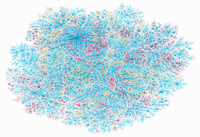| Mind Ecosystems | 2004-01-27 16:44 5 comments |
 by Flemming Funch by Flemming FunchSome words from Bala Pillai: "Imagine a world where each of us can telepathically find and match with our complements instantly. Any moment we have a want or a have.His writing is dense, but very inspiring. And I often find myself thinking in similar paths. A big reason the world isn't working better is that we're having a hard time matching needs with haves. We're bad at connecting resources up with where they would do the most good. It is hard for people to find out who they would accomplish the most by working with. Hard to find *complements*. And the problem is primarily informational. We don't really know. We don't have good information, so we go by crude and artificial constructs, like what is advertised for sale on TV, or who we run into at a party. To imagine a world where we all had a high level of telepathy is an excellent starting point for a lot of revolutionary possibilities. Lies would no longer have any manipulative value if everybody could see right through them and know the truth without bias. You'd have to really do good things to be seen as doing something valuable. Duh. Same with hypocritical morals. You can't get away with applying different rules to others than what you live by. If you're a smuck, everybody will know it. And then the point Bala is getting at. If you somehow could perceive directly and instantly what everybody in the world needed and wanted, and what resources were available, there'd of course be no reason to waste time and energy on all the stuff that doesn't fit and doesn't work. If you really KNEW, you'd of course do the things you most want to do, where they make the most difference, and with the people who're most suited and interested in doing it with you. No need to do useless activities in a job you don't like, for a company that produces some junk that people wouldn't really want if they knew what it was and what the alternatives were. And you'd help others do what they want to do when it is easy for you to do so. If you happened to know your neighbor also needs a bag of sugar from the market and that he's currently busy, you can just bring it for him, instead of you both having to go. If you're done with that book you're reading, you can just toss it to a guy on the street who also want to read it, rather than taking it home and hide it in the garage. And, yes, maybe we can work towards that kind of world, and maybe ways we can organize ourselves, technologies we might employ, and ways we might think about it can take us a great deal of the way. Even short of a global evolutionary leap that gives us all holographic telepathy and clairvoyance. And, yes, nature probably is one of our best teachers in that. After all, ecosystems quite masterfully manage to ensure that nothing really is wasted, even though it all can seem a bit chaotic. No used paperbacks and nuclear waste gets stacked up forever in nature's ecosystems. Whatever one sector needs might well be a waste product from another sector. Whatever you leave behind probably gets eaten up by something else. And telepathy probably has nothing to do with it, so we ought to easily be able learn from what trees and ants and bacteria are doing. And maybe find better ways of synchronizing our work with less friction. |